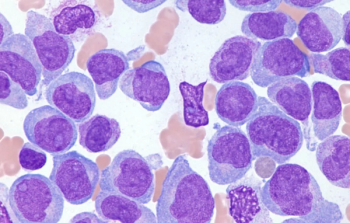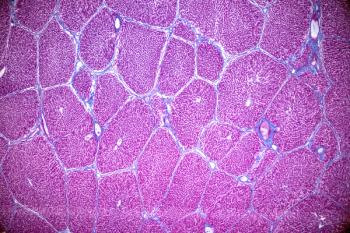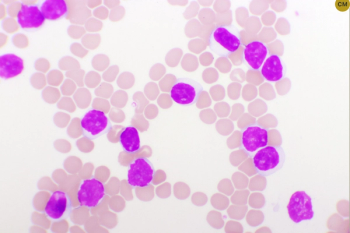
Investigators report that the 2 individuals receiving the 120-mg dosage had 3 probable immune-related adverse events, which provides supportive evidence of immune activation.

Investigators report that the 2 individuals receiving the 120-mg dosage had 3 probable immune-related adverse events, which provides supportive evidence of immune activation.

Five-year progression-free survival in the CLL14 trial is approximately 63% in the targeted treatment arm, according to new data.

In an analysis of data from 2 patient cohorts included in the phase 2 BYLieve study, investigators found that the data may indicate an increased dependence on the mutant PI3K-α.

Results from a phase 3b study showed that venetoclax combined with azacitidine or decitabine can safely be initiated in a US community-based outpatient setting.

Blinded independent central review analysis also adds confidence to the findings.

JZP458, a recombinant Erwinia-derived ASNase from a Pseudomonas fluorescens expression platform, was previously approved by the FDA for patients with ALL/LBL who had developed hypersensitivity to Escherichia coli (E. coli)–derived ASNase.

Investigators reported that individuals who completed 10 cycles of lurbinectedin and doxorubicin who then switched to lurbinectedin as a monotherapy tended to have maintained or improved tumor response.

Investigators found that individuals receiving selinexor had a median PFS of 5.7 months compared to 3.8 months for those given the placebo, with a stratification adjusted hazard ratio of 0.70.

The ability to measure GFR would be a significant advancement for clinicians in the United States.

Scot Ebbinghaus, MD, vice president of oncology clinical research at Merck, discussed the growing body of research surrounding pembrolizumab (Keytruda) and what it is currently being investigated for.

Additionally, the 2-time dependent variables, dose reduction, and relative dose intensity 2 (RDI2) were included in the respective model as covariates to explore the connection to overall survival.

Overall, the investigators observed that the CR, undetectable minimal residual disease rates, progression free survival, and overall survival amomg the patients enrolled in the trial were favorable.

Ginna Laport, MD, discussed the growing body of research surrounding venetoclax.

In a collaboration using a neutral zone, organizations do not have access to each other’s data, but will instead have access to insights gathered by pooling their data together with other organizations for analysis by artificial intelligence technology.

Beth Koselke, PharmD, BCOP, discusses the impact of pharmacist intervention in clinical trial enrollment, specifically in the MYLUNG Consortium.

All individuals who received second-line chemotherapy regimens met the PFS2 endpoint and all but 1 individual had died at time of data cutoff, according to a presentation at 2022 ASCO Annual Meeting.

Rucaparib at the 400 mg dosage combined with nivolumab and ipilimumab for 4 cycles will continue onto a phase 2 trial for individuals with relapsed ovarian cancer.

Nicholas Robert, MD, chief medical officer at Ontada, discusses disparities in biomarker testing and how they are being addresses at ASCO 2022 Annual Meeting.

Biomarker positive patients were randomized to maintenance rucaparib 600 mg or matched placebo within 10 weeks of completing PBC until disease progression.

Findings of the phase 2 cohort and the phase 1b cohort of the KRYSTAL-1 study are being presented at the 2022 American Society of Clinical Oncology Annual Meeting.

The researchers noted that the objective of the study was to assess the trends of 1L PARPi maintenance treatment uptake and PFS of patients with newly diagnosed AOC.

New results from the ATHENA-MONO trial investigating the use of rucaparib in patients with ovarian cancer show promise.

The trial achieved a complete remission rate of 39.4%, which researcher Michael Dickinson, MBBS, DMedSci, called "remarkable."

Circulating tumor DNA tests could someday replace CT scans for cancer management, according to Bruce Feinberg, DO.

Bruce Feinberg, DO, vice president and chief medical officer at Cardinal Health Specialty Solutions, discussed how a cancer diagnosis and treatment can impact patients’ mental health.

Pharmacy Times spoke with Amila Patel, PharmD, chief clinical officer at Navigating Cancer, to learn about digital health solutions in oncology and what she sees for the future of these solutions.

Trastuzumab deruxtecan shows superior and clinically meaningful progression-free survival and overall survival benefit in patients with HER2-low unresectable and/or metastatic breast cancer with hormone receptor-positive or negative disease.

Three-year follow-up analysis shows that Gilead’s car T-cell therapy induced high rates of durable response and a median overall survival of 46.6 months.

Sacituzumab govitecan-hziy (Trodelvy) found to lower the risk of disease progression or death by 34% in patients with hormone receptor-positive/human epidermal growth factor receptor 2-negative metastatic breast cancer.

AstraZeneca trial results shows 90% of patients with chronic lymphocytic leukemia surviving for 5 years.